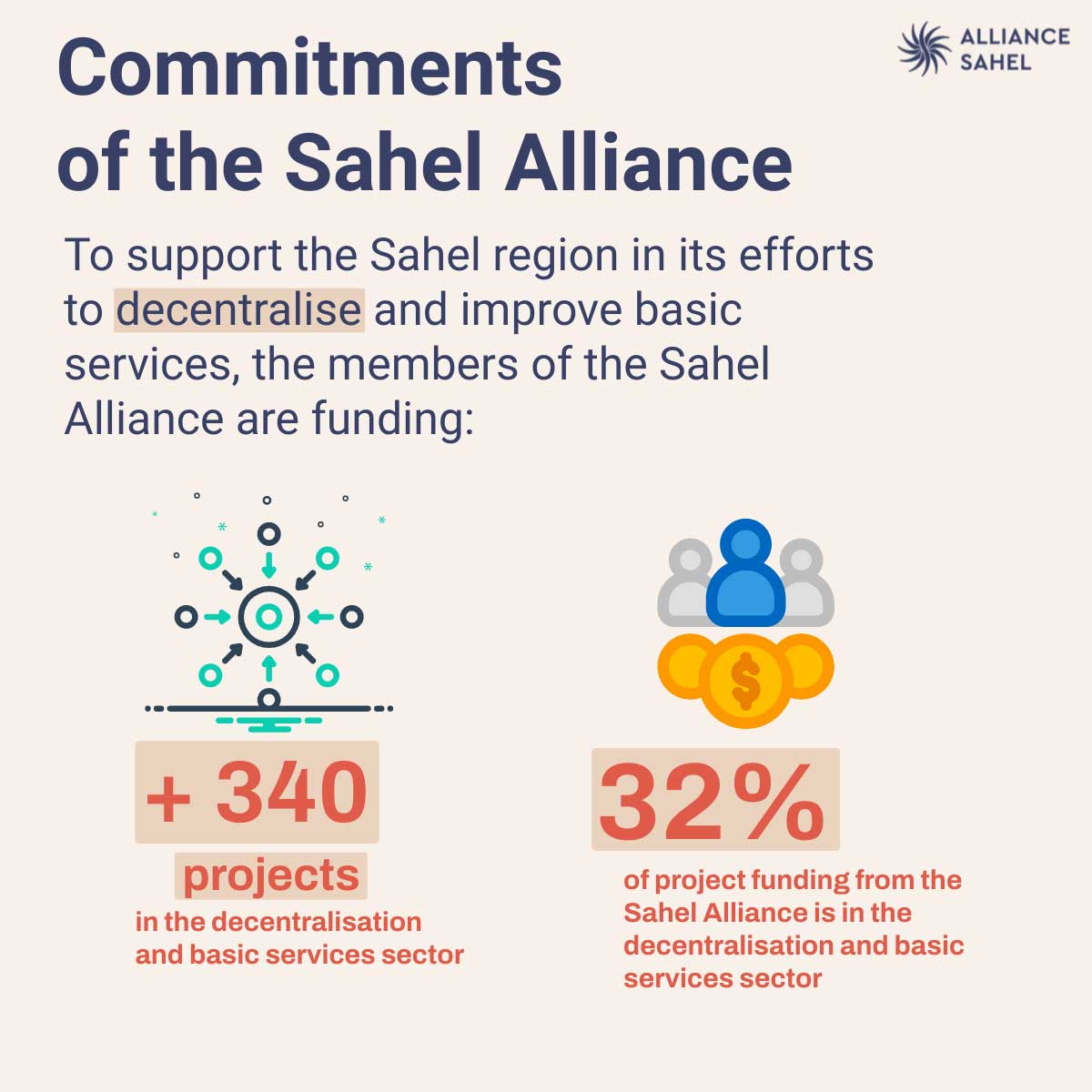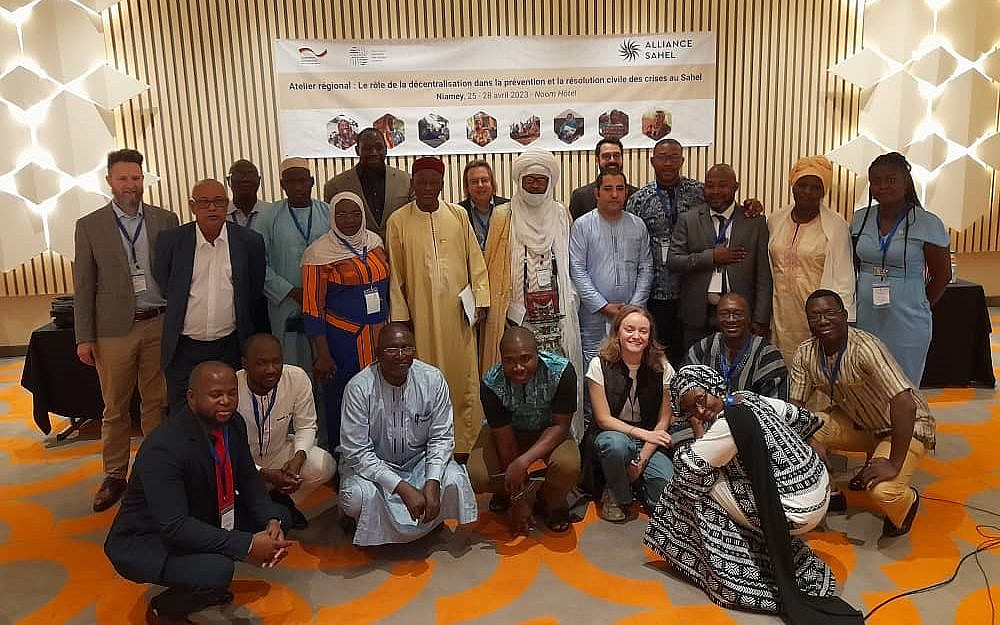Decentralisation, a Factor in Prevention and Civil Resolution of Crises in the Sahel?
Despite the serious crises in several parts of the Sahel, the region offers vast opportunities and potential, including a very young and talented population, a rich culture and history, and diverse and abundant natural resources that can contribute to stabilisation and sustainable development. Local and regional authorities play a key role in harnessing the potential of the Sahel for the development of the region. We estimate that around 65% of the objectives of the 17 Sustainable Development Goals (SDGs) cannot be achieved without the active participation, empowerment and support of local stakeholders, particularly local authorities.
From 25 to 27 April 2023, a regional workshop organised by the Sahel Alliance in Niamey was dedicated to decentralisation and its role in crisis prevention and civil resolution.
Local governments play several key roles in fragile contexts: they are the direct interlocutors of the state with the population and can ensure and systematise inclusion and participation. Moreover, they coexist with other local stakeholders (religious, customary and civil society stakeholders) who also have legitimacy among the population. They are also in charge of the development of their territories.
Despite their recognised role in the achievement of the SDGs and the legislative mechanisms for transferring competences, local governments in the Sahel face many challenges. When contributing effectively to conflict management and to building the resilience of their populations, they face a lack of resources for financing local investments and for creating jobs for young people. They also face a lack of qualified human resources as well as technical and sometimes financial capacity to provide adequate basic services and to cope with massive population displacements.

To address the role of decentralisation in the prevention and civil resolution of crises in the Sahel, the Sahel Alliance’s Decentralisation and Basic Services Working Group organised a regional workshop in Niamey from 25 to 27 April.
This event brought together strategic stakeholders from different levels involved in stabilisation and conflict management in the Sahel. This working session was organised by the two co-leaders of the Decentralisation & Basic Services Coordination Group of the Sahel Alliance, Germany (BMZ) and the Tony Blair Institute (TBI)*.

Adapting the local organisation
In his opening speech, the Minister Delegate to the Minister of the Interior and Decentralisation recalled that:
Niger, with a surface area of 1,267,000 km², borders seven countries, six of which are engaged in armed conflict with non-state armed groups, and hosts several thousand refugees and internally displaced persons (IDPs). To guarantee the security and free movement of goods and people, the State of Niger quickly instructed local authorities to organise themselves at the local level in an adaptive manner in order to continue to provide basic socio-economic services to our fellow citizens.”

The workshop brought together nearly 70 participants, including representatives of members of the Sahel Alliance, the G5 Sahel Executive Secretariat, national authorities of the host country, Local Authorities Associations (LAAs), Nigerien traditional chiefs, international and regional think tanks, and representatives of local community-based organisations.
Particular focus was placed on knowledge and experience, with the aim of translating them into concrete actions, guiding the work of the Sahel Alliance. The Spanish ambassador to Niger, spokesperson for the Sahel Alliance, stressed in her speech:
This workshop will highlight the added value of decentralised administration to move forward in integral development and to move forward in a context of multiple crises.”
The representative of Germany, Mr Cormac Ebken, mentioned the specific complex context of the Sahel:
The difficulties linked to the multisectoral crisis – security, socio-community, health, food and politics – make it difficult to explain the fragility in the sub-region and the possibilities of returning to peace.”
The President of the Association of Niger Municipalities (AMN), representing the umbrella organisations of Niger’s local authorities (AMN and ARENI), recalled:
Today, with the expansion of the security situation towards the coast, it is more than urgent that we find together mechanisms that can allow the decentralised entities to play the role of defence wall through their social and economic actions with more resilience. As such, following the example of joint and international management within the framework of COVID-19, we are entitled to ask for the systematic simplification of contracting mechanisms and procedures in areas affected by insecurity.”
Global thinking, local action
Thinking globally, acting locally implies a commitment to dialogue, human capital and capitalisation. This also requires rethinking the whole dynamic of reflection, in particular by questioning what is happening at the local level in order to better propose solutions that will be taken into account at global level.
It is in this sense that at the local level, collective intelligence reflections must be carried out, because the local authorities are the first to be impacted and they are the ones who must ensure the inclusion of vulnerable actors such as women, young people and displaced people.
A number of sub-groups were set up to capitalise on the experience of the participants and to make progress on the crucial issues facing the local government.

The workshop was closed by a concrete experience sharing, with a field visit in the urban commune of Ouallam. Around 50 participants from Germany, Benin, Burkina Faso, Mali, Mauritania and Niger exchanged with local actors on issues related to the theme of the workshop. The visitors discussed, among other things, the consequences of the crises on the delivery of basic social services and the resilience of the communes to the various challenges.
After a courtesy visit to the Ouallam prefecture, the participants of the excursion went to the Ouallam town hall to exchange on the security situation and the integration of displaced persons and refugees in the commune, but also on cross-border cooperation, cooperation between the Defence and Security Forces (DSF) and civilians, and the integration of women and young people in the prevention and resolution of crises and community conflicts.
Conclusions
A series of recommendations were formulated by the Association of Local Authorities in the form of the Niamey Declaration. The umbrella organisations of local authorities, in their key roles as local development project owners, insisted that the funding procedures of the various technical and financial partners are harmonised and that they take into account the central role of local governments.
Also, the A-APL (Alliance of Local Authorities Associations) wished to develop a structured partnership with the Sahel Alliance, organised around precise common objectives, and they affirmed their availability to co-construct with the Sahel Alliance the measures that should facilitate the appropriation, generalisation and popularisation of the integrated territorial approach.
* The GIZ Regional Project “Capacity Building for Decentralisation in West Africa”, in complementarity with the Regional Project “Strengthening Cooperation in the Sahel” and the Tony Blair Institute, will support the design and implementation of the workshop recommendations in consultation with BMZ.
Pictures: © Alliance Sahel/Sani Ousseini
Go further

